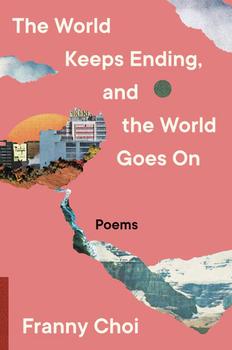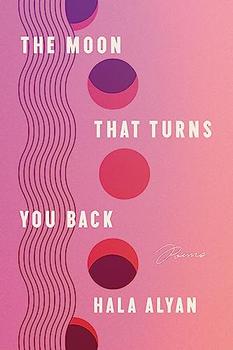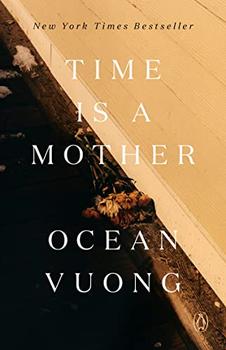Summary | Excerpt | Reviews | Beyond the book | Read-Alikes | Genres & Themes | Author Bio

Calamity can cohabit with joy, and you and I have, on some plane, accepted that absurd reality. We are living in a dystopia: Some of us can enjoy a day out with loved ones, and on our way to our warm homes, pass homeless people as if they are merely set pieces that make up the outside world. At a party, out of habit, we might check Twitter only to see another place that has been bombed, the news wedged between a funny meme and celebrity gossip, and keep scrolling until another post shows up about children with cancer. Then, something else might distract us, making it seem as if we hadn't read about these things at all. Other times, we live our own nightmares while no one around us bears witness to them, yet we somehow survive.
Franny Choi's poetry collection The World Keeps Ending, and the World Goes On is a compilation of meditations investigating the line between destruction and construction: What parts of the world or the self have died to give new life? How do we make sense of tragedy as we muscle it into a language built on the foundation of grief? Choi's emotionally heavy, earnest poems dissect these questions through a lens of generational and personal horrors. Her nuanced approach to understanding these "apocalypses" floors me.
One tool Choi uses to seek answers to the above questions is a comprehension of how the past, present and future interact with each other. The poem through which this interaction can best be explained is "Grief Is a Thing with Tense Issues." Here, Choi recites different forms of words generally used to describe stages of grief: "'Denial, anger, bargaining. Denied, angered, bargained. Will deny, will anger,/will bargain." What piqued my interest about this list is that it is presented in groups of three, each phrase corresponding to its own tense. However, there are other moments in the poem where grief is shown to inhabit a mix of all these time relationships. For example, consider a version of the grief cycle that looks like, "denied, anger, will bargain." A later stanza from the poem could be said to correspond to this potential interpretation: "The problem with using a word like 'mourning' in reference to the future. As/when a mother in a movie says to her gay son, 'You're dead to me.' She mistakes/glow for a grave, but there he is, red constellation of coals."
In the scenario described, the mother is not necessarily "in denial" but she has denied her son. She has denied him acceptance of his existence. The son, by coming out, has killed an inauthentic version of himself, but by extension, has ended his literal life in relation to her. There is a permanence to her denial, once it has been verbalized to him, as she has "[mistaken his] glow for a grave." This imagery shows how the mother's anger currently allows her to simplify her grief by seeing her son's sexuality as destructive, something that has already killed him and put him into a grave, instead of constructive, something that gives him the ability to live more authentically. The presence of the stages of grief earlier in the poem suggest that the mother may bargain over the reality of her son's life later on, but at the moment her denial of him extends over the past, present and future. Just in her work with the concept of "denial" in this stanza, readers can see how Choi blurs the lines between different stages of time. In this way, she argues that grief has the power to alter not just what is, but what was and will be.
How Choi plays with tense and time is my favorite aspect of her collection. In "Comfort Poem," the speaker of the piece is sitting at home curled up with a cat, using the present tense through the first two stanzas. In the third stanza, the poem moves into the past tense as the speaker comforts someone through a life-altering surgery. Throughout the next section, Choi uses variations on the phrase "comfort woman" to detail explicit moments of sexual violence in the past. That section is very visceral and seems like it is occurring in the speaker's present because of it. Here, I feel a level of uncomfortable intimacy with the speaker; I am transported to generational memories, ruminations of lived experiences, and conversations about devastation she has borne witness to. There are many instances in which I feel as if I am physically invading Choi's headspace as she writes to process traumas, but sometimes that seems like a very important place for me to be as a bystander.
However we manage to understand the turbulent world we live in, Choi reminds us that our lifeline is hope. She writes, "By the time the apocalypse began, the world had already ended./It ended every day for a century or two. It ended, and another ending/world spun in its place. It ended, and we woke up and ordered Greek coffees[.]" In the end, we make the conscious choice to keep living the only way we know how. We choose to be informed of our past, future and present, and try our best to push through, burdened with the weight of all our apocalypses.
![]() This review was originally published in The BookBrowse Review in February 2023, and has been updated for the
November 2023 edition.
Click here to go to this issue.
This review was originally published in The BookBrowse Review in February 2023, and has been updated for the
November 2023 edition.
Click here to go to this issue.

If you liked The World Keeps Ending, and the World Goes On, try these:

by Hala Alyan
Published 2024
From the author of The Arsonists' City and The Twenty-Ninth Year, a new collection of poetry that traces the fragmentation of memory, archive, and family–past, present, future–in the face of displacement and war.

by Ocean Vuong
Published 2023
The highly anticipated collection of poems from the award-winning writer Ocean Vuong.
Your guide toexceptional books
BookBrowse seeks out and recommends the best in contemporary fiction and nonfiction—books that not only engage and entertain but also deepen our understanding of ourselves and the world around us.